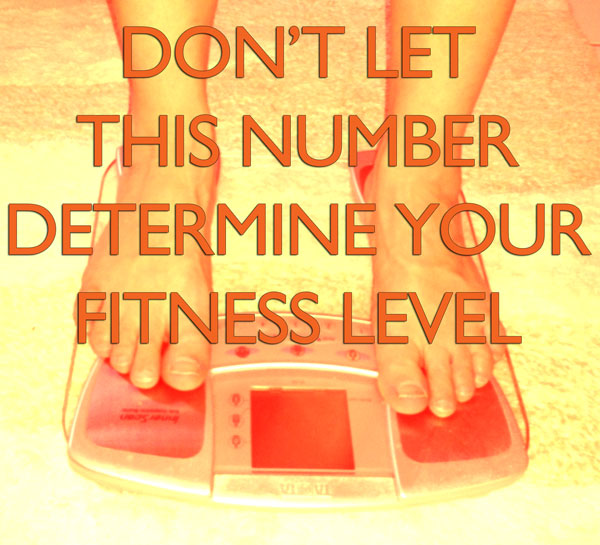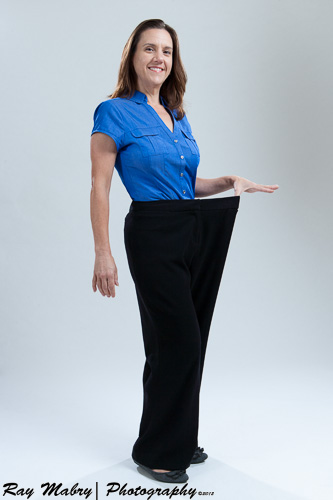Last updated on August 21st, 2013 at 10:13 am

Healthy weight gain with exercise is not something you hear in the your typical conversation on health. The majority of resources are focused on weight loss, with no focus on where that loss of weight should be coming from.
I won’t lie. I still weigh myself every morning and hashed out some pros and cons of that habit in my recent post “Track Your Fitness Progress For Dream Motivation”.
Are you still staring at the scale to find your fitness level?
Unfortunately, most conversations around a healthy body revolve around the number on the scale. Don’t we all know by now that how much you weigh just a part of how healthy you really are?
Fitness and cardiovascular health are what will keep you moving well into your golden years, but the constant distraction from those numbers on the scale can derail us from taking more positive steps.
What can cause weight gain with exercising?
While we are sweating it out, the composition of water in our bodies changes significantly every day. Staying hydrated with consistent water intake everyday can help even out the effect of this short term water weight. Those few pounds of water weight loss might look nice on the scale, but they haven’t impacted your body composition in any way.
If you do jump on the scale, you do it at the same time everyday. Right?
One time to avoid weighing yourself is after an intense workout. You may notice the scale go up a few pounds. THIS IS NORMAL. Your body is repairing muscle tissue, which may cause slight inflamation. That’s that sore feeling you have one to two days after that workout, and it will impact the number on the scale too.
Muscle does NOT weigh more than fat
Body composition is the only way to go, but I can not tell you how often I hear the argument that “muscle weighs more than fat“. On what planet?
A pound is a pound… whether it’s muscle mass, body fat, or a stack of feathers.
Knowing what your body composition is will tell you so much more than the scale will:
- Fat
- Muscle mass
- Bone
- Brain
- Internal organs
- Fluids (I really can’t list them. Use your imagination.)
Not sure body composition can relate to health? Take these comparisons of two women. They are both 5’4″ tall, both weigh 130 pounds and are about the same age.
#1 has a body fat percentage of 33%
#2 has a body fat percentage of 21%
The scale is not going to tell them that one of them has an higher level of body fat that can impact her health. Muscle mass is denser and takes up less space than fat, and once you start gaining fitness you will notice the body fat decreasing over time.
Gaining weight from exercise is a good thing
If you have lost weight and have been consistently working out – especially resistance training with weights – you will eventually notice the scale go up a bit. You may just be experiencing weight gain with exercise. I’m not talking giant gains that power lifters are looking for to “bulk up”. I’m talking a slow 2-10 pound gain over months.
This is what I’ve been struggling with myself over the past months. I want you to know what to look for so when this happens to you, you don’t lose your mind.
My scale is showing me a number I thought I would never see again, but I haven’t run screaming to the gym to burn up a treadmill.
Why?
My body fat percentage is still the same, and dropping. I track my body fat with the scale in the photo – Tanita body composition scale that spits out my weight and body fat percentage.
I haven’t grown (still short-stuff over here), added anything perky to my body, and all my clothes still fit.
The only explanation for the weight gain is muscle mass.
Letting go of the RIGHT numbers
Body fat is a much better way to judge your health and fitness and since it moves slower, if you are eating healthy and keeping up your exercise plan, you don’t need to check it as often. That means you can rely on an occasional check in at the gym with a reliable handheld body fat device, or if you have a scale that gives you that information, try not to check it that often.
Ready for a test? Put your scale away now. Make it a place that is not convenient to go grab when you are naked and in a panic. Now leave it there for a month.
How did putting that scale away feel? Comment and share!
Go get your fit on – Heather

Heather Montgomery is a fitness writer, triathlete, and serial entrepreneur who is devoted to sharing what she has learned about becoming a triathlete after age 40. She uses her Metabolic Training Certification to help other women struggling to get fit in mid-life. She lives and trains in Santa Rosa, California, the new home of the Ironman triathlon. You can find her biking the Sonoma County wine trails.
Note: Articles by Heather may contain affiliate links and will be compensated if you make a purchase after clicking on an affiliate link.




